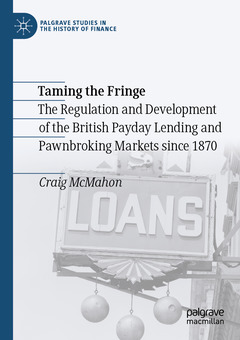Description
Taming the Fringe, 1st ed. 2021
The Regulation and Development of the British Payday Lending and Pawnbroking Markets since 1870
Palgrave Studies in the History of Finance Series
Author: McMahon Craig
Language: English
Subjects for Taming the Fringe:
Approximative price 126.59 €
In Print (Delivery period: 15 days).
Add to cartPublication date: 04-2022
234 p. · 14.8x21 cm · Paperback
Publication date: 04-2021
Support: Print on demand
Description
/li>Contents
/li>Biography
/li>Comment
/li>
Taming the Fringe analyses the regulation and evolution of two credit products that were, and remain, vital to the working poor. Policymakers have struggled with pawnbroking and moneylending because they raise broader issues pertaining to poverty, capitalism and financial regulation. The values of easily accessible credit and financial independence compete with society?s desire to protect people from predatory loans. Policymakers have pondered whether regulation can lower costs without reducing access for those most in need of small cash loans. Can government policy protect borrowers while also providing sufficient profit for lenders? The many attempts at doing so reveal the difficulty of safeguarding the needs of people who have experienced financial trouble before seeking a loan.
Taming the Fringe is the first extended study of the payday lending and pawnbroking markets in Britain, and the only one to examine over 160 years of financial results and market data. This work explains why small-value lenders have generated such passionate debate, even being described as the devil incarnate. It adds to our knowledge of fringe banking and the evolving role of financial regulation to protect the working poor. Since 1870, pawnbrokers and moneylenders have actively shaped regulation ? a viewpoint the existing literature does not address adequately. This work contributes to the scholarly and policy dialogue on financial inclusion, working-class poverty and the development and legitimacy of fringe lending.
This book analyses the motivation, content and outcome of critical regulatory episodes that have shaped fringe banking. While historians have written volumes about consumer credit, few have analysed why elite policymakers have sought to protect the working poor from some credit markets. This work demonstrates that, across time, conflicting views on poverty and liberal economic theory have, to varying degrees, influenced how thegovernment has protected the working poor, and will be of interest to financial and economic historians.
Craig McMahon is an Assistant Professor of Economic History at Villanova University, USA and is an affiliate of the Centre for Financial History, Darwin College, UK. He received his PhD from the University of Cambridge, UK. Craig has over 20 years of experience in the capital markets, international consultancy and non-profit management. He teaches courses on the development and regulation of banking markets, American economic development, global political economy and globalization.




